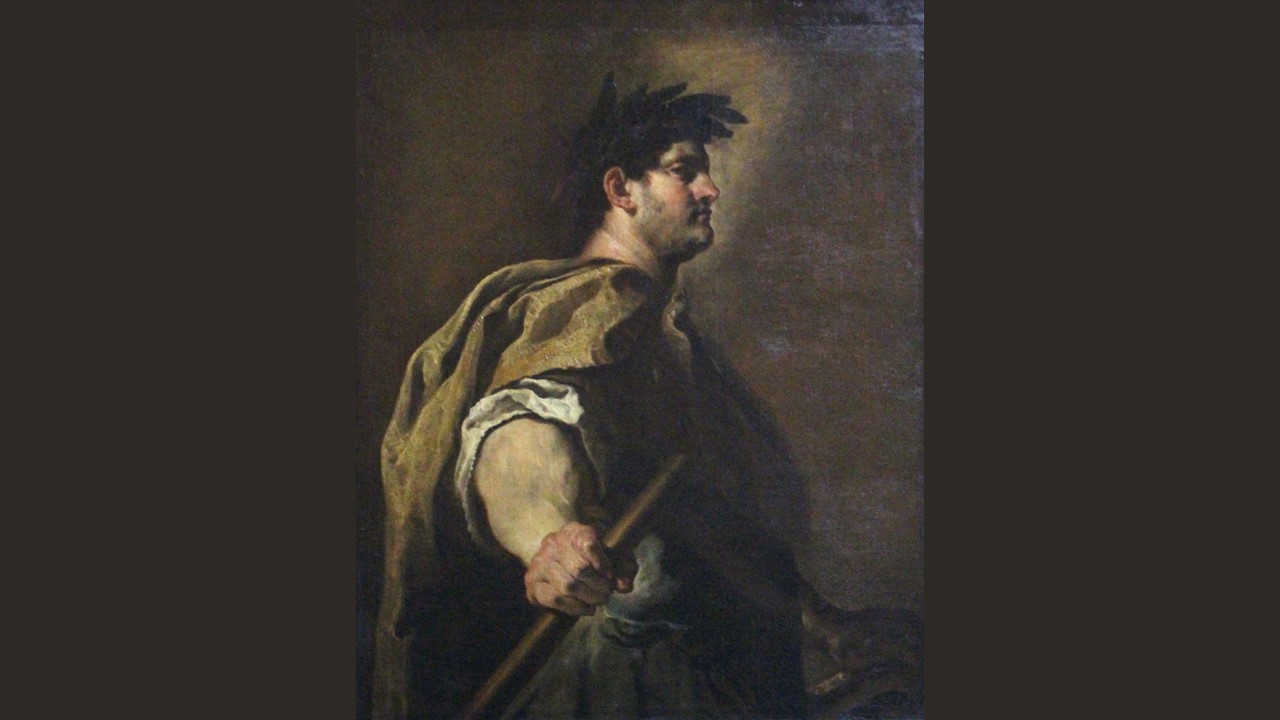The Graeco-Roman historian Lucius Dio Cassius, in his Roman History, describes “dark dinners” that were given by the emperor Domitian to specially chosen guests.
Domitian’s dinners served to terrify;
Their purpose was to harrow and appall—
Guests would imagine that this ghastly meal
Was meant to be their last: a grisly joke
Conceived by the Emperor’s cruelty and spite,
A scourge and cross of dark anticipation.
Gloom enveloped everything except
The flickering of funerary lamps,
Ebony tables, food as black as pitch,
And blackened silent boys who glided by
Like specters out of hell, or sable panthers
A-prowl at nighttime in a shadowed wood.
Dishes of smooth obsidian, and cups
Hollowed from rarest onyx, lumps of coal,
Cloth double-dyed in ink of cuttlefish—
As if the very radiance of life’s sun
Were in eclipse forever, and cold death
Made the whole world a foetid mausoleum.
No one could make a sound. Domitian’s voice
Broke the stiff silence of the cheerless room,
And he spoke in a harsh, slow, measured growl
Of murder, sudden death, mortality.
It was as if the underworld had sent
A harbinger of doom’s impending blow.
For place-cards there were tombstones, each inscribed
With an epitaph that named the man
Who lay reclining near it. At the close
Domitian bade goodnight in solemn tones.
The diners left escorted by strange guards
Who uttered not a word. When home at last
And shivering in bed, each frightened guest
Was roused by knocking. At his doorway stood
Armed soldiers scowling, and an emissary
Who held Domitian’s sealed imperial scroll.
This was the normal prelude to arrest,
Followed by swift and certain execution.
Everyone thought himself condemned to die.
Some wept, while others froze in stony silence.
Such was the culminating final blow
Foreshadowed by that fatalistic dinner.
Those who partook of it gave up all hope,
Envisioning Hades, Cerberus, and Styx.
But it was not to be. Instead of death,
The emissary brought a raft of gifts:
Gold and silver, precious objets d’art,
And even the ink-stained slaveboy (now washed clean)
To be the guest’s sweet-scented Ganymede—
Treasure, fine art, and supple youthful limbs.
Peripeteia! Safe now and reprieved,
What did the guests learn from that tomb-dark dinner?
Only that hope and joy lay in the jaws
Even of death. Domitian’s will alone
Could make the difference in determining
Whether the axe would fall, or pass you by.
Joseph S. Salemi has published five books of poetry, and his poems, translations and scholarly articles have appeared in over one hundred publications world-wide. He is the editor of the literary magazine Trinacria. He teaches in the Department of Humanities at New York University and in the Department of Classical Languages at Hunter College.















Grotesque. A Roman/gothic tale well and darkly told–one I had never heard
before. It comes as no surprise that Domitian was eventually assassinated and that (as Wikipedia so delicately puts it) because he had “offended the aristocratic elite, the Senate ordered the damnation of his memory.” The darkness of the banquet reminds me of the “worship” environment created by Anton LeVey as the liturgical setting for his “Church of Satan” back in the 1960s. It is also reminiscent of mock firing squads used by various repressive regimes to assert power and instill terror, such as the one faced by Dostoyevsky in 1849. Similar, but without the gifts.
What I notice (about Mr. Salemi’s nine blank-verse sestets) is their easy modulation; and “Domitian’s Dark Dinners” is another example, if one needed one, of Mr. Salemi’s profound association with the Silver Age in Latin literature. I can think of no contemporary of ours who draws so deeply and heavily from that era, nor does any figure of English literature quickly come to mind; though, of course, Baroque and Neoclassical writers, from late Shakespeare to Pope and Swift, offer glimpses. From American literature, it is Poe who comes to mind in diction and topic, except for the Frostian fluidity and occasional Shakespearean phrase, like “a harbinger of doom’s impending blow”.
A well-told story of this strange ritual. It provides a vivid reminder of how sickness of all sorts plagues both rich and poor, powerful and powerless, and how too much luxury can infect the soul in strange ways.